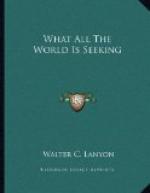It was this that the old gentleman had brought,—a gold frame, and in it a poem cut from a volume, a singularly beautiful poem through which was breathed the spirit of love and service and self-devotion to the good and the needs of others. At one or two places where it fitted, the pen had been drawn across a word and Mr. Beecher’s name inserted, which served to give it a still more real, vivid, and tender meaning. At the bottom this only was written, “From a poor Hebrew woman to the immortal friend of the Hebrews.” There was no name, but this was sufficient to tell the whole story. Some poor, humble woman, but one out of a mighty number whom he had at some time befriended or helped or cheered, whose burden he had helped to carry, and soon perhaps had forgotten all about it. When we remember that this was his life, is it at all necessary to seek farther why all the world delights to honor this, another royal-hearted elder brother? and, as we think of this simple, beautiful, and touching incident, how true and living becomes the thought in the old, old lines!—
“Cast thy bread upon
the waters, waft it on with praying breath,
In some distant, doubtful
moment it may save a soul from death.
When you sleep in solemn silence,
’neath the morn and evening dew,
Stranger hands which you have
strengthened may strew lilies over you.”
Our good friend, Henry Drummond, in one of his most beautiful and valuable little works says—and how admirably and how truly!—that “love is the greatest thing in the world.” Have you this greatest thing? Yes. How, then, does it manifest itself? In kindliness, in helpfulness, in service, to those around you? If so, well and good, you have it. If not, then I suspect that what you have been calling love is something else; and you have indeed been greatly fooled. In fact, I am sure it is; for if it does not manifest itself in this way, it cannot be true love, for this is the one grand and never-failing test. Love is the statics, helpfulness and service the dynamics, the former necessary to the latter, but the latter the more powerful, as action is always more powerful than potentiality; and, were it not for the dynamics, the statics might as well not be. Helpfulness, kindliness, service, is but the expression of love. It is love in action; and unless love thus manifests itself in action, it is an indication that it is of that weak and sickly nature that needs exercise, growth, and development, that it may grow and become strong, healthy, vigorous, and true, instead of remaining a little, weak, indefinite, sentimental something or nothing.




